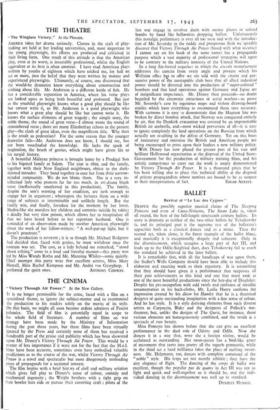" The Wingless Victory." At the Phoenix.
THE THEATRE
AMERICA takes her drama seriously. Classes in the craft of play- making are held at her leading universities, and, most important to the young playwright, his efforts are produced and criticised in their living form. One result of this attitude is that the American play, even at its worst, is invariably professional, whilst the English equivalent at its best is often amateur. I have read American plays written by youths of eighteen which have tricked me, for half an act or more, into the belief that they were written by mature and experienced playwrights. Ultimately, of course, one discovered that the would-be dramatist knew everything about construction and nothing about life. Mr. Anderson is a different kettle of fish. He has a considerable reputation in America, where his verse plays are looked upon as being both beautiful and profound. But just as the youthful playwright knows what a good play should be like but cannot write it, so Mr. Anderson is a good playwright who knows what a great play should be like but cannot write it. He knows the surface elements of great tragedy ; the simple story, the noble theme, the sound of great verse—I almost wrote the sound of remembered verse ; there are many Elizabethan echoes in the present play—the clash of great ideas, even the magnificent title. Why then is the result so pedestrian? For the same reason that the younger dramatist fails—Mr. Anderson does not know, I should say, has not been vouchsafed the knowledge. He lacks the spark of inspiration, the brush of .genius, which might have given life to his turgid history.
A beautiful Malayan princess is brought home by a Prodigal Son to his bigoted family at Salem. The year is 'Soo, and the family, together with their New England neighbours, object to the dark- skinned intruder. They band together to oust her from their narrow- minded community. We do not blame them. She is a very in- tellectual lady who protests far far• too much, in soi-disant blank verse (ineffectually smothered in this production). The family, despite the son's warning of her erudition, are rash enough to engage her in argument ; whereupon she lectures them on a wide range of subjects at interminable and unlikely length. But the family win, and finally, forsaken for the moment by her lover, Medea-like she murders her children and commits suicide by taking a deadly but very slow poison, which allows her to recapitulate all that we have heard before to her repentant husband. One is reminded of an observation made by another American playwright about the work of her fellovi-writers: " A well-put-up light, but it doesn't penetrate."
The production is reverent ; it is as though Mr. Michael Redgrave had decided that, faced with genius, he must withdraw once the rostrum was set. The cast, as a lady behind me remarked, " stood about talking," some in a loud and forceful manner—this party was led by Miss Wanda Rotha and Mr. Manning Whiley—some quietly. Chief amongst this party were that excellent actress, Miss Mary Merrall, Miss Rachel Kempson and Mr. Andre van Gysegherp. I


























 Previous page
Previous page